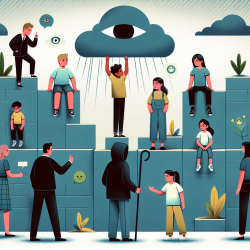Introduction
The COVID-19 pandemic has reshaped numerous industries, including construction, as highlighted in the research article "Early Impacts of the COVID-19 Pandemic on the United States Construction Industry." While this might seem distant from the field of speech-language pathology, particularly in online therapy services like those provided by TinyEYE, there are valuable lessons to be learned from how the construction industry adapted to the pandemic's challenges. By examining these strategies, practitioners can enhance their skills and improve outcomes for children in educational settings.
Adapting Risk Management Strategies
The construction industry faced significant challenges, such as project delays and material shortages, which necessitated robust risk management strategies. Similarly, online therapy services can benefit from proactive risk management. Consider the following approaches:
- Task Force Formation: Establish a team to continuously assess and adapt to evolving challenges, ensuring that therapy services remain uninterrupted.
- Safety Protocols: Implement comprehensive safety measures for in-person interactions, such as social distancing and sanitization protocols, to protect both therapists and clients.
- Technology Utilization: Invest in reliable technology infrastructure to facilitate seamless online therapy sessions and minimize disruptions.
Embracing New Opportunities
The construction industry identified new opportunities during the pandemic, such as fast-tracking medical facility construction. Similarly, online therapy services can explore new avenues to enhance service delivery:
- Teletherapy Expansion: Expand teletherapy offerings to reach a broader audience, including underserved communities that may have limited access to in-person services.
- Innovative Program Development: Develop specialized programs that address emerging needs, such as social-emotional learning support for children affected by pandemic-related stress.
- Collaboration with Schools: Strengthen partnerships with educational institutions to integrate therapy services into remote learning environments effectively.
Implementing Safety Measures
The construction industry adopted various safety measures, such as face coverings and social distancing, to protect workers. In the context of online therapy, consider the following adaptations:
- Virtual Training: Provide comprehensive training for therapists on best practices for conducting online sessions, ensuring they are equipped to deliver effective therapy remotely.
- Parental Involvement: Encourage active parental involvement during therapy sessions to enhance engagement and reinforce learning outcomes.
- Feedback Mechanisms: Establish feedback loops with clients and their families to continuously improve the quality of online therapy services.
Conclusion
By examining the construction industry's response to the COVID-19 pandemic, online therapy practitioners can gain valuable insights into risk management, opportunity identification, and safety measures. These lessons can be adapted to enhance the delivery of therapy services, ultimately creating better outcomes for children. To delve deeper into the original research paper, please follow this link: Early Impacts of the COVID-19 Pandemic on the United States Construction Industry.










